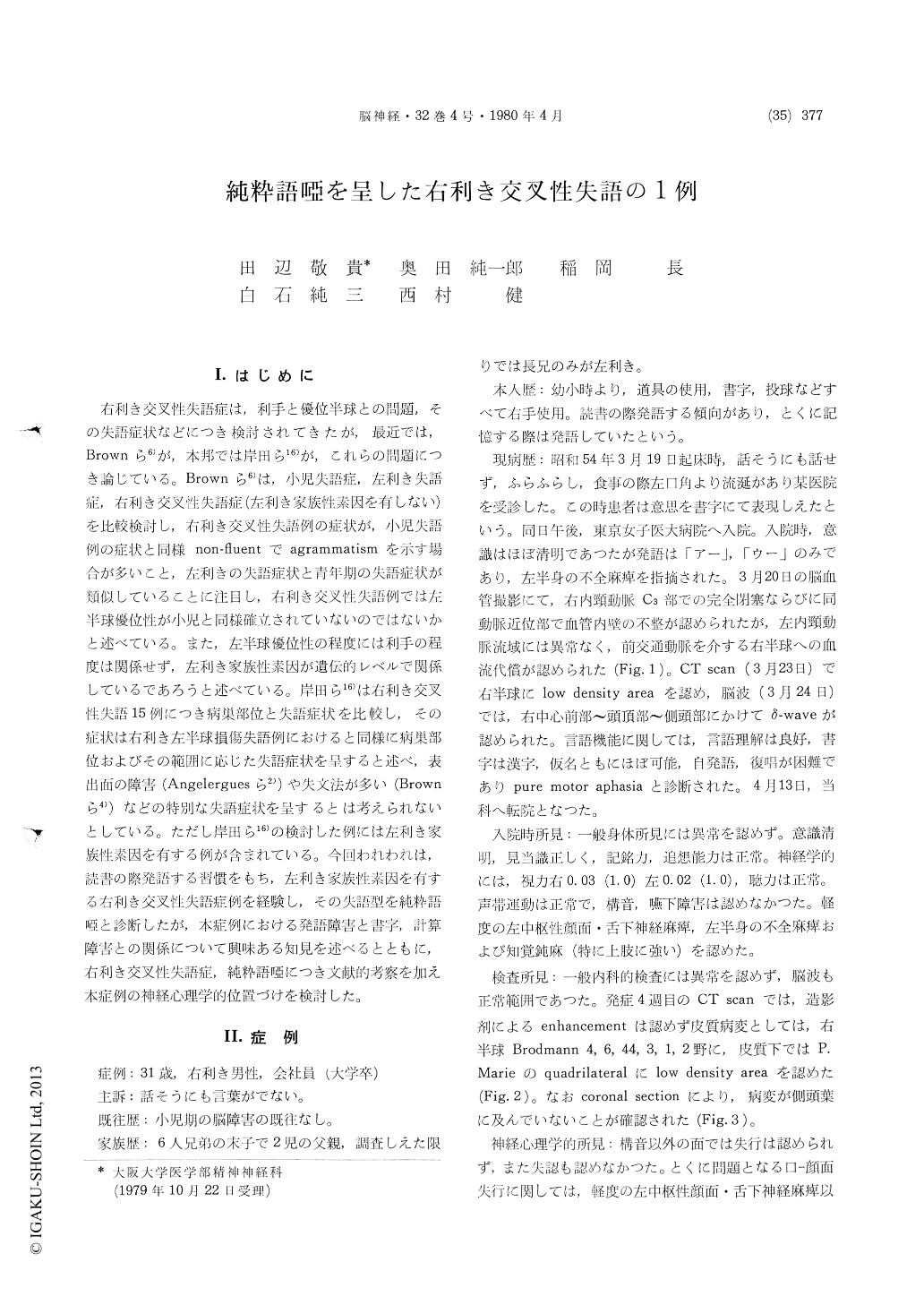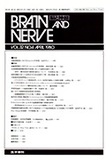Japanese
English
- 有料閲覧
- Abstract 文献概要
- 1ページ目 Look Inside
Ⅰ.はじめに
右利き交叉性失語症は,利手と優位半球との問題,その失語症状などにつき検討されてきたが,最近では,Brownら6)が,本邦では岸田ら16)が,これらの問題につき論じている。Brownら6)は,小児失語症,左利き失語症,右利き交叉性失語症(左利き家族性素因を有しない)を比較検討し,右利き交叉性失語例の症状が,小児失語例の症状と同様non-fluentでagrammatismを示す場合が多いこと,左利きの失語症状と青年期の失語症状が類似していることに注目し,右利き交叉性失語例では左半球優位性が小児と同様確立されていないのではないかと述べている。また,左半球優位性の程度には利手の程度は関係せず,左利き家族性素因が遺伝的レベルで関係しているであろうと述べている。岸田ら16)は右利き交叉性失語15例につき病巣部位と失語症状を比較し,その症状は右利き左半球損傷失語例におけると同様に病巣部位およびその範囲に応じた失語症状を呈すると述べ,表出面の障害(Angelerguesら2))や失文法が多い(Brownら4))などの特別な失語症状を呈するとは考えられないとしている。ただし岸田ら16)の検討した例には左利き家族性素因を有する例が含まれている。
The patient is a 31-year-old right handed man. His family are also right handed except one brother. The patient was so accustomed to speak aloud or silently when reading and memorizing. He devel-oped the disorder of articulation, left hemiplegia and left hemihypesthesia after the occlusion of the C3 portion of the right internel carotid artery. Otherwise, there were no abnormalities in the physical and laboratory findings.
The brain lesion was confirmed by CT scan. It involved both the cortical and subcortical portions of the pre- and post-rolandic areas in the right hemisphere, extending into the Pierre Marie's quadrilateral space. The coronal sections in CT scan verified that the right temporal lobe was spared. Intra-carotid amytal test was not applied to this patient because of early cross circulation to the right hemisphere from the left side.
The patient's articulation was disturbed especially in voluntary repetition and in reading aloud. With regard to his disturbance of articulation, he stated that he could not immediately assume the correct positions of his tongue and lips. But he did not show buccofacial apraxia except in articulation. Accordingly, we diagnosed disturbance of articula-tion as apraxia of speech.
His understanding of spoken and written language, writing in Kanji (ideographic letters) and calcula-tion about addition and subtraction were intact. However, his writing in Hiragana (phonemic letters) was mildly disturbed, and his operation of the Japanese multiplication table"Kuku"was also disturbed. The difficulty in writing in Hiragana became manifest when we made him bite his tongue, which we designated the "lingual lock test." We usually need articulation in the process of learning "Kuku." And so we suppose that latent articula-tion would be necessary for its operation. From these aspects, it is thought that his disturbances in writing Hiragana and in operating"Kuku"would be based on apraxia of speech which involves minimal latent articulation.
The above-mentioned neurolinguistic finding led us to diagnose the case as pure word dumbness. Although it must further be investigated whether the disturbance in writing Hiragana at the lingual lock test would be popular to the aphasic patients with the disturbance in writing Hiragana, or par-ticular to them with the peculiar habit of language, or characteristic to the patients with apraxia of speech, we thought that the examinations in lan-guage habits of individuals and in the modalityof writing in Hiragana and of calculation, es-pecially operation of "Kuku ", would at least be important in the diagnosis of pure word dumbness.

Copyright © 1980, Igaku-Shoin Ltd. All rights reserved.


